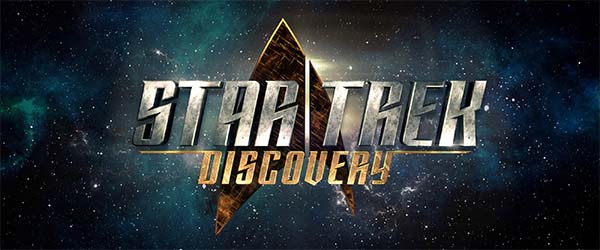
After a myriad of false starts, delays, production problem, bad PR, and generally negative expectations, Star Trek: Discovery finally premiered at the end of September. And the general consensus online seems to be pretty positive. It's not going to be the anthology series that I'd hoped for, but I didn't hate the first two episodes. I really didn't like them either, though.
Based on the season preview following the end of the second episode, it seems like it's kind of hard to gauge the series after just the first two episodes. They seem like more of a "prologue" to the main story, rather than part of the main story itself. These first two episodes take place on a different ship, with a different captain and crew, and a different situation than the rest of the show. So I don't know how representative they are going to be of the series itself.
The first two episodes see Captain Georgiou killed and the Shenzhou destroyed.
It seems a bit disingenuous (to me) for CBS to air only the first episode and then expect us to shell out $6 a month for the rest of the season. The first two episodes seem like they should have been the bare minimum, but three would have been even better, just so that audiences could see what the series proper is going to look like. Ideally, they should have aired the entire first season and then moved subsequent seasons to the streaming service. As it stands, I still don't trust the show enough to feel inclined to spend the money on a subscription. After all, it could be that the first few episodes were conceived under the direction of Bryan Fuller, and his spat with the studio, and subsequent departure from the project, could have lead to a radical change in direction for later episodes. But then again, those creative differences apparently cropped up before filming the premiere even started, so who knows how much of Fuller's creative vision even survived at all (despite the fact that he's credited as the creator and lead story writer in the opening credits).
Maybe I could pay for one month (or do a free trial) and then binge the entire rest of the series?
Anachronisms, and apparently space is no obstacle
Right off the bat, I had a lot of the knee-jerk reactions that I was expecting to have due to uniform anachronisms, costume and makeup redesigns, and so forth. CBS went to the trouble to recreate phasers and communicators that resemble the ones from the original Star Trek pilot, and apparently even made Klingon blood pink (ala Star Trek VI), but they couldn't be bothered to design ship-specific insignia badges for the uniforms? Everybody wears the delta-shield, which was supposed to be an emblem unique to the Enterprise. It was only adopted as the symbol of Starfleet (as a whole) later, in part because of the increased militarization of Starfleet due to the threat of the Klingons, and in honor of the Enterprise's service.
Just as I'd feared, everyone is wearing the same delta shield insignia.
And in the interests of fairness to the new Star Wars movies, I also can't neglect to mention the problem that the Discovery premiere had with distance... [More]
3f1397f1-d2ca-443b-95ee-d0cad5d4422f|0|.0
Tags:Star Trek, Star Trek: Discovery, science fiction, CBS, all access, streaming television, Bryan Fuller, Sonequa Martin-Green, Michael Burnham, Sarek, James Frain, Vulcan, human, Klingon, war, Shenzhou, Philippa Georgiou, Michelle Yeoh, T'Kuvma, Chris Obi
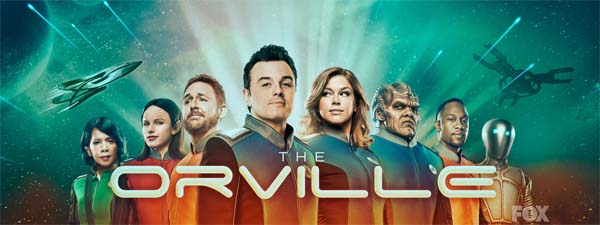
Discovery isn't the only Star Trek show on TV this fall -- at least, in spirit anyway. September saw the premiere of Seth McFarlane's Trek-clone The Orville. Orville stumbled out of the gates at first with a premiere episode that I really didn't like. But it's been slowly getting better -- or at least, less bad, with each of the first few episodes being substantially better (though still not entirely effective) than the premiere.
A lot of this has to do with a shift in the show's tone. The show was advertised and marketed as a comedy (basically, a televised version of Galaxy Quest), and I went into the first episode with a comedic mindset, and that premiere episode definitely went out of its way to try to tell jokes. That was a problem because the jokes (and by extension the show) just wasn't funny. The focus on comedy and gags also detracted from the serious drama, which was poorly-written, sloppily-executed, and which revolved around a dumb sci-fi MacGuffin. Further, much of the comedy involved stupid pop culture references which are going to quickly become dated; thus, hurting the show's lasting re-watchability if it ever becomes good enough to warrant rewatching.
If you think Star Trek needs more dick and fart jokes --
or more dogs licking their balls in the background, then The Orville is for you.
The problem is that MacFarlane just isn't that good at writing jokes. It pains me to say this because I was a huge fan of Family Guy when it first premiered, and I'll still defend the quality of those first two seasons. But MacFarlane seems to be completely arrogant in his own joke-writing ability, while simultaneously completely dismissive of the audience's ability to grasp the jokes that he seems to think are much more complex and clever than they actually are. Most of these jokes boil down to being fart or sex jokes, and very few work on more than the most juvenile and immature of levels. Perhaps the best example of this is a joke in which the Captain Mercer puts a distress call on the viewscreen. The distressed scientist has a dog in the background who spends the entire conversation licking his balls. It was mildly funny due to its relative subtlety. Yeah, I guess that probably happened occasionally to Captain Archer in Enterprise. Ha ha. But then as soon as the conversation was over, the viewscreen flicks off, and the navigator and helmsman say "Hey, did you see that dog licking his balls?" What little subtlety is gone; joke ruined!
It's like McFarlane thinks he has to remind the audience that there was a joke, and that you should have been laughing, even though the joke wasn't that funny to begin with. This is the same problem that I've always had with laugh tracks in sitcoms: all they do is remind me that the jokes aren't funny. Except McFarlane doesn't use a laugh track, he writes the "hey, there was a joke here. Did you get the joke?" into the script!
"Command Performance" had humor more appropriate for its sci-fi set-up and relationship drama.
The next two episodes, however, seemed to plant their feet more firmly in the territory of genuine sci-fi concepts and character drama, and the show was stronger for it. The execution, however, is kind of hit-or-miss... [More]
70d52091-ba33-4edf-9546-e800ddef74cf|1|1.0
Tags:the Orville, Seth MacFarlane, science fiction, comedy, Union, Moclan, Galaxy Quest, Star Trek, space, exploration, politics, religion, women, gender, gender equality, transgender, equality, futurism, progressive, allegory, straw man, fallacy
The initial announcement of Star Trek: Discovery looked very promising. Unfortunately, the news has not been as good since then.
First of all, the first teaser showed some lackluster CGI effects, but I was willing to dismiss that as being evident of the show's early prouction. But then news kept getting worse. Bryan Fuller stepped down as the showrunner, CBS repeatedly stated that the show won't be an anthology (even though an anthology would be a great idea), and the show was delayed from January to March. Now it's been delayed again - this time indefinitely. The delays appear to be related with CBS's in ability to get its streaming service off the ground, delays in casting, and scheduling conflicts with those who have been cast.
But production has started, and the first teaser trailer has come out.
A behind the scenes teaser gives a look at uniforms, sets, possible ship redesigns, and the captain's chair.
The first thing that stood out to me is the tease of the new uniforms, which resemble a combination of the Star Trek: Enterprise uniforms, and the cadet uniforms from the rebooted Star Trek movies. But there's a huge flaw in this uniform: the breast badge is the delta shield. Since this is a prequel to the original series, this uniform is unlikely to belong to an Enterprise crew member, even though that delta shield was unique to the Enterprise in the original series.
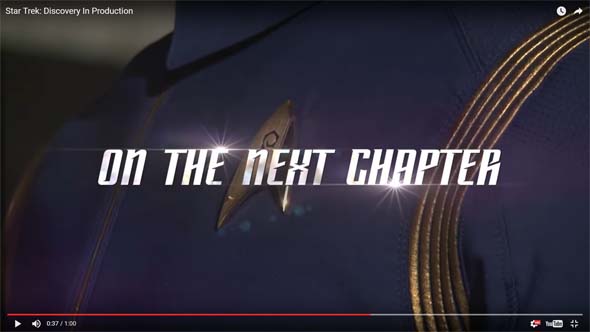
The Discovery teaser shows a delta shield badge on a pre-TOS uniform - which is a Star Trek faux pax.
In the Original Series, each ship, starbase, or installation had its own unique mission badges, similar to contemporary NASA missions. This was a detail that even Star Trek: Enterprise got right! But the Abrams reboot, and now the new Discovery series have broken with this detail, making the uniforms anachronistic within established series' canon.
Each ship, starbase, or installation in The Original Series had its own unique mission patch, inspired by NASA missions.
By the time of The Next Generation, Starfleet had adopted a single insignia for the use of its communicator badges, which was based on the Enterprise 1701's mission insignia. Of course, this badge was a piece of technology, rather than a simple patch on a shirt, so there could have been technical limitations that required the adoption of a single insignia.
UPDATE: FEBRUARY 10, 2017:
Since seeing the trailer and writing this post, it has come to my attention that I may have over-reacted to the insignia. The presence of this insignia may be a reference to the possibility that the lead character of the show is going to be the first officer from the original Star Trek pilot. This character was played by Majel Barrett (who later went on to protray Nurse Chapel), and this character was un-named, and was only called "Number One"). So this character would have previously served onboard the U.S.S. Enterprise with Captain Pike. Perhaps this insignia is on Captain Pike's uniform?
Either way, the fact that this insignia is still being used as the show's insignia bothers me, as the show is called "Star Trek: Discovery". The insignia for the show should be the Discovery's insignia, and the Discovery should have an insignia all its own. But this insignia is dangerously close to the original Enterprise's [More]
daf66755-c254-4474-af34-b9985da63c4e|1|5.0
Tags:Star Trek, Star Trek: Discovery, CBS, Paramount, Bryan Fuller, NASA, uniform, delta shield, mission patch, U.S.S. Discovery, anthology, Number One, Majel Barrett
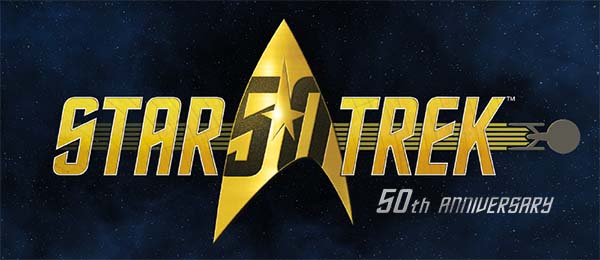
On September 8, 1966, a cultural revolution started. The first episode of a new science fiction television series named Star Trek premiered on NBC. This series broke new ground in the genre of science fiction by being one of the first series ever to present high science fiction concepts to television audiences, while also using its space adventures as allegories for contemporary social and political issues. While it presented itself as mindless space adventure in the same vein as Buck Rogers and Flash Gordon, it took a serious approach to science fiction that (at the time) was limited to literature like the novels of H.G. Wells and the stories of Isaac Asimov.
Star Trek wasn't the first serious science fiction television series. Shows like The Twilight Zone and The Outer Limits had existed for a almost a decade. But Star Trek differed from these series in that it depicted a revolutionarily positive and uplifting version of the future of humanity during the height of the paranoia of the Cold War. Humanity, according to Star Trek would overcome the threat of mutual destruction that the Cold War between the United States and the Soviet Union posed, and we would come out the other side with a spirit of cooperation and a desire to peacefully and benevolently explore the stars, exploring strange new worlds and seeking out new life and new civilizations.
Television science fiction was dominated by childish adventures like Buck Rogers
and more cynical anthology series like The Twilight Zone that drew off of Cold War paranoia.
The show was created by Gene Roddenberry, a former United States army air force pilot and Los Angeles police officer who eventually found his calling as a television writer and producer. He wrote and produced some police dramas and westerns before pitching his defining project: Star Trek. The show was picked up by Desilu Productions, a company that was run by Lucille Ball (yes, the titular actress of I Love Lucy) and her husband. The production of Star Trek was tumultuous. The show was canceled by NBC after its second season, only to be revived due to an unprecedented, fervent letter-writing campaign staged by its fans. It did not survive its third season, however, as Desilu Productions was rapidly running out of money, was forced to cut budgets, and NBC moved the show to the dreaded Friday night "death" slot. In an age before DVRs, or even VCRs, if people were out on the town on a Friday night, and they missed an episode of a show, then that episode simply went unseen.
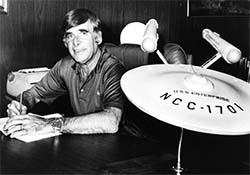
Gene Roddenberry's optimistic vision
of the future remains endearing.
The series eventually saw tremendous success after its cancellation due to its episodes being syndicated during the 1970's. It gained a cult following that grew and grew, setting up conventions that would come to draw thousands of attendees. Though not immediately apparent, Star Trek would grow to become one of (if not the) most successful science fiction properties in the world. The series is often cited by scientists, engineers, and astronauts as their inspirations for their careers, and the technology of the series has inspired many real-world technological innovations, such as wireless communication, mobile devices (in particularly mobile phones), speech-recognition software, and so on. Roddenberry became the first TV writer to receive a star on the Hollywood walk of fame, has been inducted into the Science Fiction Hall of Fame and the Academy of Television Arts & Sciences Hall of Fame, and was one of the first human beings ever to have his ashes carried into earth orbit... [More]
a36b33e8-1404-42b1-9723-a4759be0acee|2|5.0
Tags:Star Trek, Star Trek: the Next Generation, Star Trek: Deep Space Nine, Star Trek: Voyager, Star Trek: Enterprise, Star Trek: Discovery, Star Trek VI: the Undiscovered Country, Star Trek: Beyond, birthday, anniversary, science fiction, allegory, humanism, humanist, Gene Roddenberry, NBC, CBS, Fox, Paramount, Desilu Production, Lucille Ball, Cold War, Balance of Terror, The Measure of a Man, Kirk, Spock, Data, Gul Dukat, Seven of Nine, Star Trek the Experience, Las Vegas, Wallace Shawn, Grand Nagus Zek
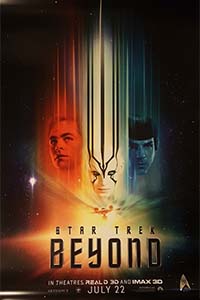
Star Trek: Beyond
I didn't really know what to expect from this movie. I was pleased that Abrams wasn't directing anymore, and that Roberto Orci and Alex Kurtzman weren't writing it. Simon Pegg writing seemed like good news. Justin Lin of Fast and Furious fame directing seemed questionable. The casting of a villain was also disappointing, as it seemed to set the stage for yet another dumb action movie. I watched the trailers, but I tried to avoid larger spoilers and speculation. I didn't want to go into the movie with a bias the way I did with Into Darknes because of all the speculation about Benedict Cumberbatch's character (would he be Khan? Would he not be Khan?).
I was really hoping for Simon Pegg to write a more pure science fiction story instead of a schlocky action movie, especially after the success and hype surrounding The Martian. "Beyond" sounds like a good title for a Star Trek movie. Maybe it would feature the crew of the Enterprise dealing with some kind of environmental challenge out in the unexplored frontiers of space? Maybe it would actually be about exploration and discovery? Maybe it would tell some timeless allegory for the human condition? I could only hope. The announcement of a villain sort of shattered that hope.
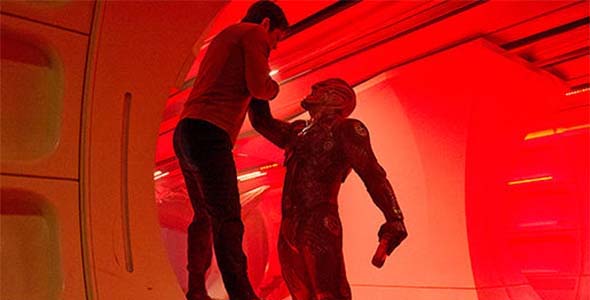
Yet another vengeful supervillain looking for a McGuffin doomsday weapon.
It doesn't help that the villain is really under-written, and that the plot revolves around the bad guy trying to get a McGuffin in order to activate a doomsday weapon. We've only sat through this plot a hundred times in sci-fi and comic book movies over the past decade. If his plan was to attack the space station anyway, then I don't know why he didn't just do it right from the start, while the Enterprise (and the McGuffin) were docked. Come to think of it, why is the Federation building massive, civilian space stations within eyesight of an ominous, unexplored nebula? Meh, I guess that's better than needing the Enterprise to warp back and forth between Earth and the Klingon homeworld in the span of a couple hours... [More]
80e21af4-18df-4984-a5d5-91fbbe299730|1|4.0
Tags:Star Trek, Star Trek: Beyond, Star Trek XIII, Justin Lin, Chris Pine, James Kirk, Karl Urban, Leonard "Bones" McCoy, Zachary Quinto, Spock, Leonard Nimoy, Idris Elba, Krall, Simon Pegg, Montgomery Scott, Enterprise, Yorktown, Franklin, starbase, McGuffin, J.J. Abrams, Alex Kurtzman, Roberto Orci, Star Trek II: the Wrath of Khan, Star Trek III: the Search for Spock, science fiction
|

| 12 | | | | | | | 60 | | 11 | | | | | | | 55 | | 10 | | | | | | | 50 | | 09 | | | | | | | 45 | | 08 | | | | | | | 40 | | 07 | | | | | | | 35 | | 06 | | | | | | | 30 | | 05 | | | | | | | 25 | | 04 | | | | | | | 20 | | 03 | | | | | | | 15 | | 02 | | | | | | | 10 | | 01 | | | | | | | 05 |
|